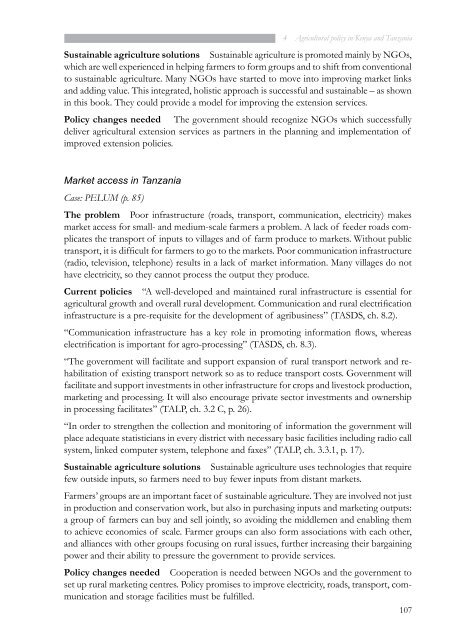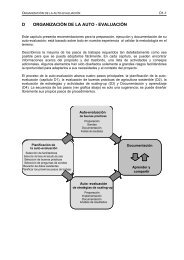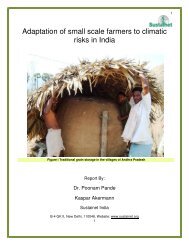cases from tanzania - Sustainet
cases from tanzania - Sustainet
cases from tanzania - Sustainet
Create successful ePaper yourself
Turn your PDF publications into a flip-book with our unique Google optimized e-Paper software.
4 Agricultural policy in Kenya and Tanzania<br />
Sustainable agriculture solutions Sustainable agriculture is promoted mainly by NGOs,<br />
which are well experienced in helping farmers to form groups and to shift <strong>from</strong> conventional<br />
to sustainable agriculture. Many NGOs have started to move into improving market links<br />
and adding value. This integrated, holistic approach is successful and sustainable – as shown<br />
in this book. They could provide a model for improving the extension services.<br />
Policy changes needed The government should recognize NGOs which successfully<br />
deliver agricultural extension services as partners in the planning and implementation of<br />
improved extension policies.<br />
Market access in Tanzania<br />
Case: PELUM (p. 85)<br />
The problem Poor infrastructure (roads, transport, communication, electricity) makes<br />
market access for small- and medium-scale farmers a problem. A lack of feeder roads complicates<br />
the transport of inputs to villages and of farm produce to markets. Without public<br />
transport, it is difficult for farmers to go to the markets. Poor communication infrastructure<br />
(radio, television, telephone) results in a lack of market information. Many villages do not<br />
have electricity, so they cannot process the output they produce.<br />
Current policies “A well-developed and maintained rural infrastructure is essential for<br />
agricultural growth and overall rural development. Communication and rural electrification<br />
infrastructure is a pre-requisite for the development of agribusiness” (TASDS, ch. 8.2).<br />
“Communication infrastructure has a key role in promoting information flows, whereas<br />
electrification is important for agro-processing” (TASDS, ch. 8.3).<br />
“The government will facilitate and support expansion of rural transport network and rehabilitation<br />
of existing transport network so as to reduce transport costs. Government will<br />
facilitate and support investments in other infrastructure for crops and livestock production,<br />
marketing and processing. It will also encourage private sector investments and ownership<br />
in processing facilitates” (TALP, ch. 3.2 C, p. 26).<br />
“In order to strengthen the collection and monitoring of information the government will<br />
place adequate statisticians in every district with necessary basic facilities including radio call<br />
system, linked computer system, telephone and faxes” (TALP, ch. 3.3.1, p. 17).<br />
Sustainable agriculture solutions Sustainable agriculture uses technologies that require<br />
few outside inputs, so farmers need to buy fewer inputs <strong>from</strong> distant markets.<br />
Farmers’ groups are an important facet of sustainable agriculture. They are involved not just<br />
in production and conservation work, but also in purchasing inputs and marketing outputs:<br />
a group of farmers can buy and sell jointly, so avoiding the middlemen and enabling them<br />
to achieve economies of scale. Farmer groups can also form associations with each other,<br />
and alliances with other groups focusing on rural issues, further increasing their bargaining<br />
power and their ability to pressure the government to provide services.<br />
Policy changes needed Cooperation is needed between NGOs and the government to<br />
set up rural marketing centres. Policy promises to improve electricity, roads, transport, communication<br />
and storage facilities must be fulfilled.<br />
107




